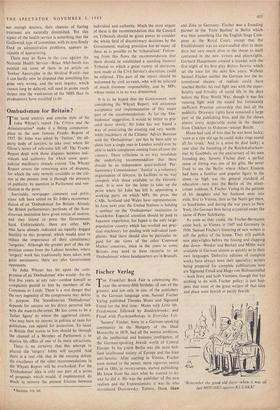Fischer Verlag
THE Frankfurt Book Fair is celebrating this year the seventy-fifth birthday of one of the greatest, and not only in size, of the publishers in the German language. area. Samuel Fischer Verlag published Thomas Mann and Sigmund Freud for the first time: Mann with Little Mr. Friedemann, followed by Buddenbrooks; and Freud with Psychopathology in Everyday Life.
'Sammy' Fischer, born in a German-speaking community in the Hungary of the Dual Monarchy in J859, had all the intense ambition, all the intellectual and business intelligence, of the German-Speaking Jewish world of Central Europe. In his youth Berlin was the most bril- liant intellectual society of Europe and the least anti-Semitic: After starting in Vienna, Fischer soon moved to the newer, more vigorous centre and in 1886, at twenty-seven, started publishing. He knew from the start what he wanted to do. and he did it. He was the publisher of the new realism and the Expressionists; it was he who introduced Dostoievsky, Tolstoy, Ibsen, Shaw
and Zola to Germany. Fischer was a founding partner in the `Freie Buehne' in Berlin which was then something like the English Stage Com- pany at the Royal Court, except that the Establishment was no straw-stuffed shirt in those days but very much alive to the threat to itself contained in the new writers and playwrights. Gerhard Hauptmann created a scandal with the first night of his first play Before Sunrise which set the tone for the next few years. Without Samuel Fischer neither the German nor the in- ternational theatre of realism could have reached Berlin; his real fight was with the super- ficiality and frivolity of social life in the days before the First World War, though it was his running fight with the stupid but fortunately inefficient Prussian censorship that had all the publicity. Dramatic rights have remained a large part of the publishing firm, and the list shows almost every respectable name in the theatre from Chekhov to Osborne—except Brecht.
Mann had said of him that he was born lucky; 'even at a ripe old age he could make rings round all his rivals.' And in a sense he died lucky; a year after the founding of the Reichskulturkam- mer by Goebbels, on the anniversary of his own founding day, Sammy Fischer died; a perfect sense of timing was one of his gifts. He never lived to see the Berlin where Albert Einstein had been a familiar and popular figure in the street—so high was the general standard of education—turn into the Berlin of the street- - corner yobboes. S. Fischer Verlag in the persons of his daughter and her husband went into exile, first to Vienna, then as the Nazis got there, to Stockholm, and during the war years to New York, the German firm being aryanised under the name of Peter Suhrkamp.
As soon as they could, the Fischer-Bermanns came back, to Vienna in 1947 and Germany in 1950. Samuel Fischer's fostering of new writers is still the policy of the house. They still publish new playwrights before the hissing and clapping dies down—Wesker and Beckett and Miller were available in German almost as quickly as in their own languages. Definitive editions of complete works have always been their speciality; writers being prepared for complete publications now are Sigmund Freud and Hugo von Hofmannsthal —both Jews, and both Viennese, though that has nothing to do with Fischer policy; it just hap- pens that most of the great writers of that time and place were Jewish or partly Jewish.
'Remember the good old days—when it was all just MOUJ1KS against KULAKS?'














































 Previous page
Previous page